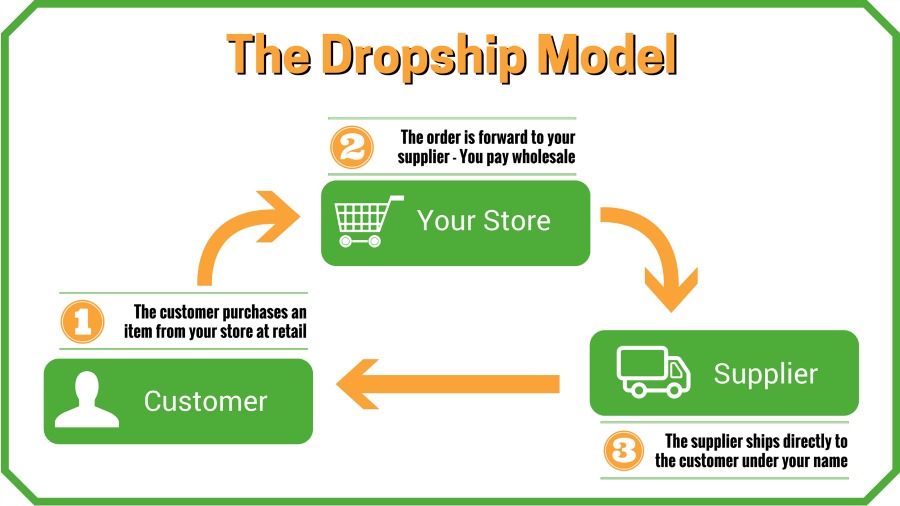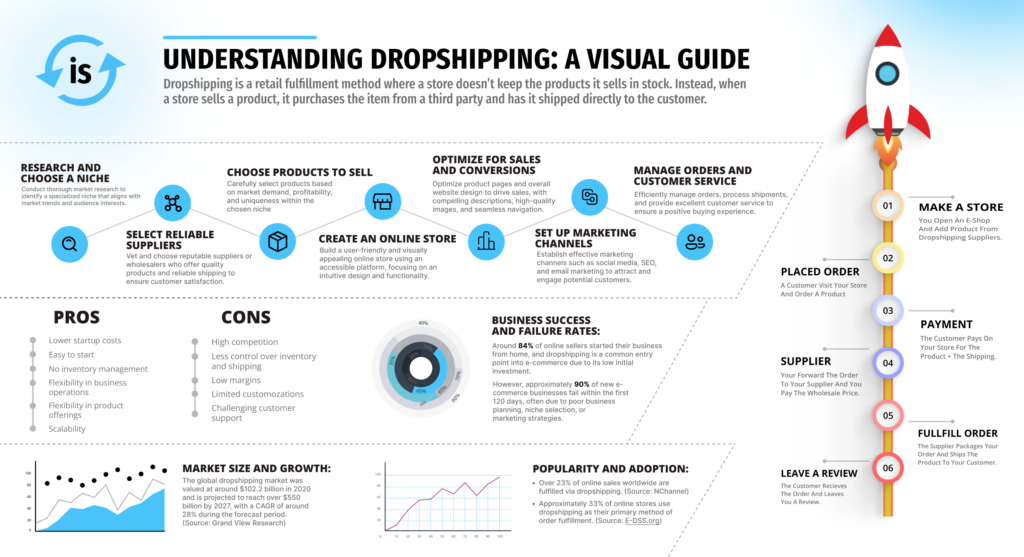Ultimate Dropshipping Guide
Chapter 1: What is Dropshipping?

What is Dropshipping?
Understanding the Modern Ecommerce Business Model
The question that got you this article must have been, ”What is Dropshipping?”
Dropshipping is one of the fastest-growing business models due to its low cost and simplicity in getting started. Once you understand the concept, you will see why it’s becoming such a popular way of doing business online.

What Is a Dropship Business?
A dropshipping business is an online store that sells products without owning or buying them upfront. Instead, the store owner orders the products from a supplier only after a customer makes a purchase. This is different from the traditional retail model where you buy products in bulk from a wholesale distributor, store them, and then ship them to customers yourself..
In a dropship retail business, the items you list on your site are stored by wholesale dropshipping suppliers in their warehouse. When you get an order for the item, your wholesaler ships that order directly to your customer on your behalf, with your name and store details on the package.
The benefit of the dropshipping business compared to the traditional retail model is you do not have to purchase large quantities of expensive inventory upfront and store it while you try to sell your products.
When you do dropshipping, you simply partner with suppliers and list the best dropshipping products for sale. When you get an order, you forward it to the supplier for fulfillment. Your customer typically doesn’t know the difference and the fact it is being shipped through your dropshipping supplier.
Source: Dropshipping.com
What are the Benefits of Dropshipping?
There are multiple benefits of ecommerce dropshipping, some of them are listed below:
Cheaper to Start and Less Risk – With dropshipping, you don’t need to invest thousands of dollars in inventory or need a warehouse for storage. Instead, you only purchase a product when you have an existing order to fill. If you do not sell products at the volume you want, you can easily change to a new wholesale dropshipping supplier and you won’t get stuck with inventory that you have to try to sell at a loss.
More Products to Offer – When you don’t have to pre-buy everything you sell, you can offer a significantly larger number of products to your customers on your dropship website or dropship eBay, Amazon account, or Alibaba dropshipping. The term “endless aisle” has been coined because of a dropship retailer’s ability to provide hundreds of thousands of products to their customer with relative ease at little to no risk.
Flexible Work and Independence – Because you don’t have to worry about fulfillment or running a warehouse, it’s possible to run a dropshipping business from anywhere with a laptop and an internet connection. You can just as easily work from an office, home, or even while on vacation. Ecommerce dropshipping allows you to scale easily.

Is a Dropship Business Profitable?
Like all businesses, success and profitability rely on a number of factors. However, when done right, it is possible to create a highly profitable online business with dropship products. If you just want to put a product on a website and sit back waiting for sales to come in, you might need to wait a long time but with better marketing strategies, you can turn the table around.
To be successful at selling the best dropshipping products, you need to dedicate time and effort to differentiate your business and compete in the market like any other business. However, unlike many other business models, it is financially “low risk” and a great model for those who are looking to learn how to build an online business for the first time.
Traditional retail will always have more profit margin per product vs. dropship retail because you get discounts for buying products in bulk. However, traditional retail also has higher costs and risks because you have to have a place to store those items, and you might get stuck with inventory you are unable to sell. This will overall increase your budget and cost for dropshipping business.
As you sell more products over time, you can often go back to your dropship supplier for better pricing on some of your items. So even if you don’t order a single item in bulk, over time, your total order volume from your dropshipping supplier can still help you to get better pricing and improve your profit margins. A good strategy for retailers to increase their margin is to test many products with dropship and then purchase these products wholesale to maximize their profit once they know they can generate sales.
One more tip for success is to be unique, not like the rest. Take the time to build out your brand and it will pay off in the long run.
What is the Typical Profit Margin on Dropship Products?
The profit margins on your dropship product sales will depend a great deal on the types of products you sell. For example, expensive electronics, such as computers and big-screen televisions, have smaller margins than fragrances or household goods.
In general, if an item is either more expensive or sells in high volume, you can see dropship margins in a pretty low range of 10-20 percent. This is because the item already has built-in demand and there is little room for you as a retailer to add value in selling an item that is being fulfilled directly from the supplier. This holds true for in-store retail sales as well as online. However, high volume, low margin businesses can make more sense in the online world vs. in-store sales because you can keep your operating expenses pretty low. If you can automate the listing and fulfillment of highly demanded products, your operating and marketing expenses are almost non-existent, making this a more than viable dropshipping business model.
The other approach is finding dropship products with a higher margin that might be in less demand or in a specialty niche. With the right dropshipping supplier relationship and products, you can see dropship product margins in the 30-50 percent range- you just need to put time into supplier relationships and product sourcing. It’s worth noting that your margin isn’t always simply anchored by the cost of the item, it also depends on you as a business. If you can find ways to offer value and build trust with your customers, you can typically charge a premium compared to other online sellers.
Where Can You Sell Dropship Products?
Dropship products are sold almost anywhere traditional products are sold. If you have shopped from Amazon, you have likely purchased an item that has been dropshipped and you didn’t even know it. Another place you can sell is eBay as many dropshipping suppliers allow on both platforms. You can also look forward to Alibaba dropshipping.
People even sell dropship items from phone or catalog sales, and copious amounts can be found on marketplaces like eBay, Amazon, Walmart, and more. When you visit a website selling products, it is very possible they are dropshipping products and using an online store or “shopping cart” platform such as Shopify, BigCommerce, WooCommerce, 3dcart, OpenCart, Magento, Volusion, etc. to do so.
Even large box retail chains sell dropship products from their websites including Walmart, Home Depot, Sears, and others. Their reasoning is the same as the smaller retail websites- dropship allows them to offer a wide range of the best dropshipping products with less risk and cost compared to trying to maintain that same product assortment in stock. Many successful online merchants (big and small) use a combination of both dropship and traditional wholesale purchasing for their ecommerce stores.
Why Should You Start Dropshipping?
Starting a dropshipping business offers multiple advantages, making it an appealing choice for aspiring entrepreneurs. Below are some possible advantages that will encourage you to start your own dropshipping business.
Low Startup Costs – With dropshipping, there’s no need for large upfront investments, as you can avoid expenses linked to inventory purchases and only pay for products upon receiving customer orders.
Minimal Risk – With no inventory to hold, entrepreneurs can eliminate the risk of unsold stock, allowing them to test new products without any financial risk associated with purchasing and storing inventory upfront.
Flexibility – Ecommerce dropshipping offers unparalleled flexibility, allowing entrepreneurs to manage their businesses seamlessly from any location with an internet connection, catering to individuals craving location independence and a customizable work schedule.
Wide Range of Products – Entrepreneurs have the advantage of accessing a vast range of products through dropshipping suppliers, allowing them to easily switch or expand their product offerings based on market trends, and platforms like Alibaba dropshipping provide endless options for sourcing the best dropshipping products to stay competitive and meet customer demands.
Scalability – Ecommerce dropshipping allows entrepreneurs to easily scale their business without logistical headaches. This allows them to focus on marketing and customer service while suppliers handle inventory and shipping.
Simplified Operations – There is no need to manage stocks or handle a warehouse. The suppliers will handle shipping and fulfillment. This will save you time and effort.
Quick Market Entry – You can start your ecommerce dropshipping business quickly by launching your online store and beginning to sell in just a matter of days.
Learning and Growth Opportunities – By gaining valuable insights into online marketing, customer service, and product trends, you can leverage this experience to grow your brand and explore other ecommerce ventures.
Dropshipping Drawbacks – The Hard Truths
Listed below are some drawbacks despite which dropshipping can still be a viable business model for those willing to overcome challenges.
- Thin Profit Margins – While dropshipping eliminates the need for inventory costs, the profit margins tend to be low due to high competition and supplier fees.
- Supplier Issues – Relying on third-party suppliers can lead to various challenges such as stockouts, shipping delays, or receiving poor-quality products, affecting customer satisfaction.
- Limited Control – As a dropshipper, you have limited control over inventory management, shipping processes, and product quality, which can impact your brand reputation.
- High Competition – The barrier to entry in dropshipping is low, leading to saturated markets and fierce competition, making it challenging to stand out and attract customers.
- Shipping Complexities – Managing shipping logistics, tracking orders, and ensuring timely deliveries can be complex, especially when dealing with multiple suppliers or international shipments.
- Customer Service Challenges – Handling customer inquiries, complaints, and returns without direct control over the product can be demanding and time-consuming.
- Profitability Threshold – Achieving profitability in dropshipping often requires scaling operations significantly, which can be difficult to accomplish without substantial investments in marketing and infrastructure.
Pros and Cons of Dropshipping
While dropshipping offers convenience and low entry barriers, it also comes with challenges such as lower profit margins and reliance on suppliers.
Pros | Cons |
| Low Initial Investment – Dropshipping requires minimal upfront investment, as you don’t need to purchase inventory beforehand. | Lower Profit Margins – With the convenience of dropshipping comes lower profit margins, as you’ll be paying wholesale prices for products. |
| Flexibility – It offers flexibility in terms of location and time, allowing you to run your business from anywhere with an internet connection. | Inventory Management Issues – You rely on suppliers to manage inventory, which can lead to issues such as inventory outages or backorders. |
| Wide Product Range – You have access to a vast range of products from various suppliers, enabling you to offer a diverse selection to your customers. | Supplier Reliability – Dependence on suppliers means you’re vulnerable to their reliability and quality of service. |
| Low Overhead Costs – Since you don’t hold inventory or manage a warehouse, overhead costs such as storage and shipping are significantly reduced. | Shipping Complexities – You have limited control over shipping times and processes, which can affect customer satisfaction. |
| Easy to Get Started – Setting up a dropshipping business is relatively easy, with many platforms offering user-friendly interfaces and tools. | Increased Competition – The ease of entry into dropshipping can lead to saturated markets and intense competition, making it challenging to stand out. |
If you found this guide helpful, share the love:
Dropshipping FAQs
What is dropshipping business?
A dropshipping business is an online store where you sell products without holding inventory. Instead, dropshipping suppliers ship the best dropshipping products directly to your customers.
How to start a dropshipping business with no money?
Start a dropshipping business with no money by using ecommerce platforms that offer free trials, partnering with dropshipping suppliers, and finding the best dropshipping products on sites like Inventory Source.
Do I need to register a business entity for dropshipping?
Yes, registering a business entity for your dropshipping business is recommended. It provides legal protection, enhances credibility, and helps manage taxes.
What are some dropshipping product ideas?
Popular dropshipping product ideas include fitness gear, phone accessories, eco-friendly products, pet supplies, and home decor. These items are often sourced from dropshipping suppliers like Inventory Source dropshipping.
How much do I need to invest to start dropshipping?
Starting a dropshipping business typically requires a minimal investment, mainly for setting up an online store and marketing. Using platforms like Inventory Source dropshipping can further reduce costs.
How do dropshippers make money?
Dropshippers make money by selling products at a higher price than they pay their dropshipping suppliers, earning a profit margin on each sale in their ecommerce dropshipping business.
What’s the difference between dropshipping and retail arbitrage?
Dropshipping involves selling products directly from suppliers without holding inventory, while retail arbitrage buys products at a discount to resell at a profit. Both can be ecommerce dropshipping strategies.
Chapter List
Chapter 1:
What is Dropshipping?
Chapter 2:
Forming a Legal Dropshipping Business
Chapter 3:
What to Sell Online
Chapter 4:
